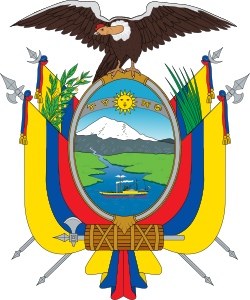Presidential election | ||||||||||||||||||||
15 October 2006 (first round) 26 November 2006 (second round) | ||||||||||||||||||||
| Registered | 9,165,125 | |||||||||||||||||||
|---|---|---|---|---|---|---|---|---|---|---|---|---|---|---|---|---|---|---|---|---|
| Turnout | 71.46% (first round) 75.93% (second round) | |||||||||||||||||||
| ||||||||||||||||||||
| ||||||||||||||||||||
 |
|---|
General elections were held in Ecuador on 15 October 2006 to elect a new President and National Congress.
Contents
- Run-off
- Opinion polls
- First round
- Second round
- Results
- President
- National Congress
- References
- External links
As no presidential candidate received a majority of the vote in the first round, a run-off was held on 26 November, which was won by Rafael Correa of the PAIS Alliance. [1]




